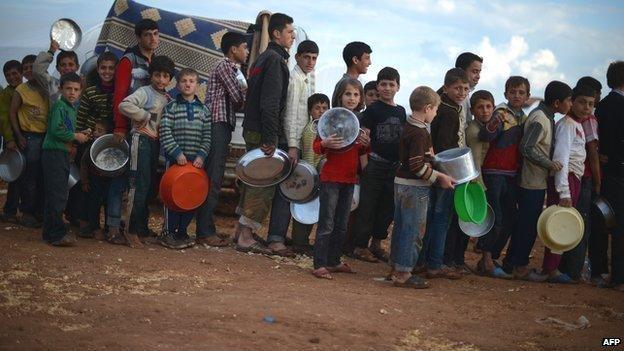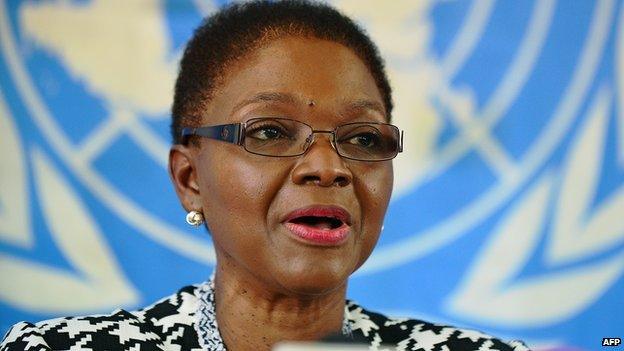Anti-terrorism laws 'hinder aid operations'
- Published

Many Syrian people caught up in the conflict rely on food distributed by aid organisations and charities
Anti-terrorism laws around the world are preventing aid agencies reaching people in desperate need, the UN humanitarian chief has warned.
Valerie Amos said more people would die in Syria because charities feared prosecution if they worked in areas controlled by the jihadist group Isis.
Aid agencies say the complexity of laws banning support for designated terrorist groups had produced a "chill factor" that slows their operations.
Baroness Amos said the law must change.
The Islamic State in Iraq and the Levant (Isis), renamed the Islamic State on Sunday, has just been listed by the UK as a banned organisation. The group now controls large parts of northern Syria and neighbouring Iraq.
Baroness Amos told the BBC's File on 4: "A couple of the charities that are able to operate in those areas are now extremely fearful that the fact that they are having to engage with Isis will have an impact on their funding, not just for Syria, but for other places as well.
"We have reports of people being on the brink of running out of food. People certainly have run out of medical supplies in many of these areas. So as the needs rise, we're having fewer people in the ground able to meet those needs and ultimately, people will die."
Many aid agencies depend on funding from the United States, the UK, and other states which ban even unintentional support for terrorists.
Charities fear individual aid workers could face prosecution if payments are made for access, or goods fall into the wrong hands.
A London-based charity, Human Care Syria, says it is unable to deliver water filters to Isis-controlled Deir al-Zour, in north-eastern Syria, where people have no clean water, until it can find "safe access which doesn't involve engaging with the proscribed groups".
Its programme development manager, Marwa Kuwaider, said: "This legislation is like an elephant walking through small plants. It's difficult for us as a small organisation, trying to work in a transparent and accountable way, to meet all the requirements in the UK."
'Money trail'
Another charity, Hand-in-Hand for Syria, says it is being forced to close a hospital it runs near Aleppo, featured in the BBC Panorama documentary Saving Syria's Children, because it cannot find a well-established, mainstream partner agency through which foreign donors would be prepared to channel funding.
Omar Gabbar, a British doctor who has worked at the hospital in Atareb, said: "It will be devastating to the whole area, they will struggle to maintain care to about 500,000 people.

Baroness Amos said anti-terror laws had to change to enable humanitarian workers to do their job
"There is something called a 'money trail' and this is where international NGOs are starting to get a bit worried. If you are giving salaries to doctors, and if one of those doctors is at some stage labelled as a terrorist, it can have an effect on them."
Hand-in-Hand for Syria's former partner decided not to seek further funding for the hospital because of security fears, including for its own staff. But the BBC understands it also had concerns about the proportion of fighters being treated at the hospital, though Dr Gabbar said these had not been raised directly with his charity.
He said: "If you deprive a whole area on the excuse that I'm worried about 10% of services going to this group, you're depriving 90% innocent people. They didn't ask for Isis to come into this area."
International humanitarian law requires anyone in medical need to be treated.
Fear that aid would fall into the hands of the Islamist group al-Shabab severely reduced help to Somalia during the famine there between 2010 and 2012.
The risk of engaging with banned groups has also limited relief and development work in Gaza, Afghanistan, Pakistan, the Philippines, and other places.
Now, the British Bankers' Association (BBA) is preparing a report for the autumn meeting of the G20 group of major economies to work out ways to overcome banks' reluctance to work with charities in areas where designated terrorists are active.
Justine Walker of the BBA said: "We are incredibly concerned that banks are being put in a situation where we are not going to be able to facilitate money into some of the most fragile and needy areas of the world."
Listen to the full report on File on 4 on Tuesday 1 July at 20:00 BST on BBC Radio 4.
Or find out more in Assignment: Shaking Hands with the Enemy on Thursday 3 July on BBC World Service. See the schedule for broadcast times.